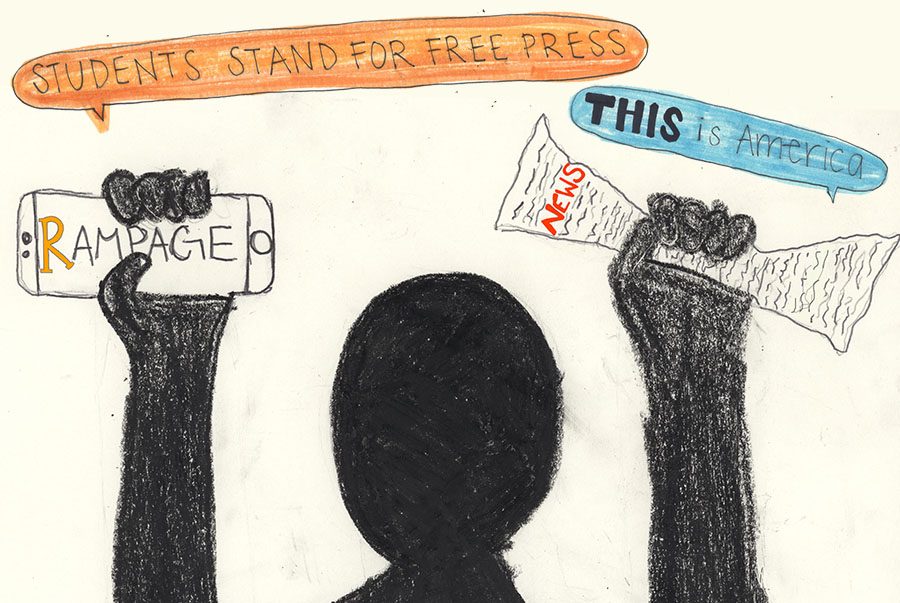Student Journalists Fight to Reverse Stigma Against Media
October 18, 2018
Over 300 newspapers wrote editorials on the importance of a free press Aug. 15 and 16 at the calling of The Boston Globe, calling attention to the importance of an unbiased, free press and its role in informing citizens on a broad range of pressing issues. More than ever, a free press is essential in today’s world and journalism, as well as student journalism, is the key to helping spread the truth.
With the onset of many vicious attacks from current and past presidential administrations–specifically journalists being labeled the “enemy of the people”–the importance of journalism, and student journalism more specifically, is more crucial than ever. In today’s society, when the truth seems to be riddled with confusion and controversy, all citizens should support unbiased media outlets presenting the facts as the result of thorough reporting that draws on numerous sources for verification.
In a Gallup and Knight Foundation Survey of 19,000 U.S. adults conducted from early August to October 2017, only 28 percent of participants believed that the news media does a good job in supporting democracy.
The dwindling number of journalism supporters is not only frightening but also dangerous. A free press is vital to a democracy and public animosity toward news outlets questions the strength of one of America’s most important founding principles which earned a spot in the first amendment: freedom of the press.
The New York Times published their own editorial in August recognizing that journalists be held accountable but also respected for their diligent work.
“Criticizing the news media — for underplaying or overplaying stories, for getting something wrong — is entirely right. News reporters and editors are human, and make mistakes. Correcting them is core to our job,” The New York Times editorial board wrote in their Aug. 15 editorial. “But insisting that truths you don’t like are ‘fake news’ is dangerous to the lifeblood of democracy. And calling journalists the ‘enemy of the people’ is dangerous, period.”
Indeed, people labeling points they disagree with as “false” or “fake” puts democracy and truth at risk, and allows for even more lies and deceit, which soon becomes ensnared in the social fabric, ultimately making facts indistinguishable from fiction.
Freedom of the press is a constitutional right guaranteed in the First Amendment, one of the many unalienable rights that the U.S. was founded on. Neither the president, nor any other citizen has the right to take that right away.
“Freedom of speech is a principal pillar of a free government; when this support is taken away, the constitution of a free society is dissolved, and tyranny is erected on its ruins,” Benjamin Franklin wrote in his 1737 essay entitled “On Freedom of Speech and the Press.”
High school newspapers are essential to schools and their communities because of their role in providing students with information about a wide range of important events and issues locally, nationally and even internationally. The survival of a free press relies on current student journalists who work tirelessly to inform the school and community about important events which requires in-depth reporting, extensive interviewing and an exhaustive process of editing and fact-checking.
Student journalists, in reporting and following the news, are also exposed to real-world problems and have a chance to offer their opinions, solutions or ideas, which is increasingly important as students become bigger proponents for social change and justice.
Just days after the horrific mass shooting at Marjory Stoneman Douglas High School Feb. 14, 2018, their school newspaper, The Eagle Eye, published an article remembering the loss of 17 members of the school and describing the terrifying event and reactions of students.
The Eagle Eye continuously reported about the shooting throughout the year, revealing new perspectives and stories that students had on that horrific Valentine’s Day. These student journalists provided crucial stories and details to their community and the nation.
The Rampage itself has come a long way in its 51 years of existence; from having only one manual typewriter with a small staff, to being a full fledged business generating revenue and using advanced design software to create graphics, infographics and creatively-designed pages, said Kevin Keegan who sponsored the Rampage from 1978-2001. But the principles and objectives guiding the Rampage and journalism have always stayed the same. Thorough and fair coverage. Multiple sources. Fact checking. The voice of RHS.
The decreasing amount of supporters of print and online journalism is alarming to witness, especially in a time when the truth must be spread to counteract the attacks on the news media. Whether it be a national news event or a school newspaper’s opinion on school matters, journalists are essential to today’s society and should be supported by the public.
Humans are naturally biased and mistakes are inevitable, and reputable news outlets should always try to catch and fix any mistakes, employing the highest degree of ebjectivity.





